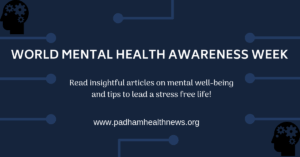Mental Illness- No! Not me!
This is the most frequent response we get when we talk to people about mental illness. This group of disorders, as frequent as hypertension or arthritis, just as or even less chronic than diabetes and as amenable to treatment as any other physical ailment has always been considered as the “other man’s problem” says Dr.R.Thara, Director, Schizophrenia Research Foundation SCARF.
Disorders of the mind are not just sequelae of the stress of the modern era. As early as around 1500 BC, description of insanity as ” unmada” was found in the Atharva Veda, the most ancient authentic Indian medical scripture. Ancient epics as Ramayana and Mahabharata describe several emotional states such as depression and the Bhagavad Gita is probably a classic example of “ crisis intervention psychotherapy”.

Despite all this, awareness and understanding of mental illnesses among the general public and even among the medical fraternity remains abysmally low. The stigma attached to them is great leading to delayed and incomplete treatment. It is also for this reason that religious and magical modes of treatment are being sought, very often leading to increasing severity of these illnesses.
When one talks of mental illness, thanks to the associaed stigma, it is often the picture of an ill clad, unkempt person on the streets who can be aggressive, violent or the giggly, incoherent woman, clinging to a doll as portrayed in films that comes to one’s mind. This is far from actual reality.
While severe mental disorders such as schizophrenia and manic-depressive disorders affect nearly 1% of the population, it is common mental disorders such as depression and anxiety, which are widely prevalent. It has been estimated that about 30% of patients who go to general physicians have some kind of emotional problems.
These are either responsible for the symptom itself or aggravate it. Chronic headaches, back aches, stomach problems, giddiness, vomiting, lack of sleep, poor appetite, menstrual irregularities, feelings of weakness and tiredness are some of the conditions that can be either caused or worsened by emotions disorders. It is essential for the treating physicians to be aware of this and for the family to be receptive to suggestions of seeking professional help to sort them out.
There is a large body of evidence that depression and anxiety are disabling conditions for a variety of reasons. It can lead to problems in attention and concentration, poor motivation, increased irritability, impaired judgement all of which can affect the completion of everyday tasks. The association between depression and women’s health should also be borne in mind. Puberty, pregnancy, childbirth, menopause can all be associated with increased emotional and psychological problems.
Also read: Depression in menopausal women is real- read about it
While on one hand, non-recognition of psychiatric problems is a concern, the increasing use of tranquillizers by general physicians is equally worrying. A WHO study reported that 10% of primary care attendees in a city in India were prescribed tranquillisers, a figure similar to that of European and North American centres. Another finding was the unnecessary use of tonics, often at the insistence of the patient or the family. It is absolutely imperative that we avoid a cocktail of medicines of little therapeutic value. Adjuvants such as yoga, meditation, physical exercise, relaxation and leisure activities should be actively considered.
The stigma associated with mental illness:
Finally, a word about stigma. Fifteen years ago, leprosy was considered a dreaded disease. Today it is not so. We understand that it is caused by a pathogen and if treated early and adequately can be completely cured. The same holds good for mental disorders.
They are either due to some imbalance in the brain functioning or an inability of the individual to cope with stress or both. If diagnosed early, many of them can be completely cured.
A positive healthy family and social environment will go a LONG WAY in ensuring a speedy recovery. A society, which is able to tolerate crime, violence, cheating fraud and corruption from so-called normal persons should well be able to understand the problems of a disturbed mind and come forward to accept them in its fold. The media should also be more responsible and stop portraying the mentally as comical, reprehensible or violent persons thereby reinforcing a negative stereotype.
